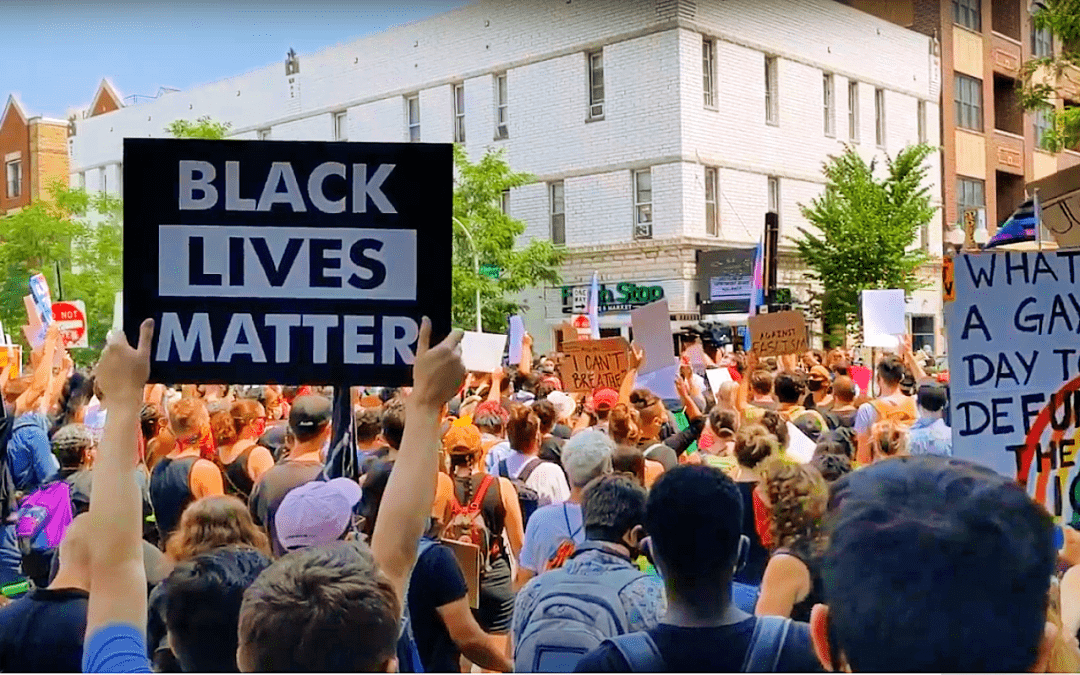Photo credit: Philip Joseph
In June of this year, violence and social unrest erupted in the United States after the murder of George Floyd. (see here for a timeline on the resulting protests)
We believe it is the ELI’s role to provide pertinent information to our students, many of whom lack the necessary context to even start to attempt understanding the situation.
This post is a timeline of the ELI’s response and will be updated as needed.
Sep 2
We apologize to our students for the extensive delay in publishing this post. We have been collecting our thoughts and resources but also were not able to prioritize this response due to increased commitments with regards to the remote work environment. We hope that this information is still useful and encourage you to keep on learning.
June 24
The ELI held a Reading Group discussing Ta-Nehisi Coates’ “The Case for Reparations” and Ibram X. Kendi’s “The American Nightmare.”
June 10
The ELI distributed a survey to our listserv with the following: “Are you struggling to understand what has been happening in the U.S. these past few weeks regarding the protests against the murders of George Floyd, Breonna Taylor, Ahmaud Arbery, and countless others? You can ask your questions or voice your concerns here anonymously. We will do our best to provide you with answers and resources in a follow-up email.”
We received two questions/concerns, and our response can be seen below, indented:
- Question received: “Thanks for setting this form to send our concerns. I have one question: Why do some parts of the US still have monuments in public places that praise slavery-supporting figures from the South?”
- ELI response: It’s a good question, and the short answer is ‘white supremacy,’ which is an issue not just in the US but in other countries as well. For a comprehensive answer, we recommend the following resources: (i) “Is this the end for colonial-era statues?” (video); (iia) Whose Heritage? Public Symbols of the Confederacy (comprehensive overview by the Southern Poverty Law Center); (iib) Sep 1, 2020 update to the SPLC report.
- Question received: “First, I personally support the BLM movement in every respect. That said, I have the following concerns as an international student: 1. I understand that racism is THE problem in this country, with systematic racism everywhere including the university, but still, as an international student, I feel discomfort especially in the university atmosphere where everything seems to be interpreted from a race perspective. Diversity here is often interpreted to mean racial diversity only (or racial and gender diversity at most), which is sometimes confusing and discomforting for foreigners. Racial discrimination is rightly an existential problem for domestic students (I believe it should be), but there doesn’t seem to be enough acknowledgment for people from outside the US society framework and have other problems in their minds. 2. A related issue, racial discrimination is not a unique issue to the US, whereas the university does not seem to be acknowledging much about that. Of course, the university resides in an African-American neighborhood, which constrains what can be said officially, but as a leading world-class institution, I feel that many of the actions are taken from an extremely (too much) US-centric world view, and the lack of a universal (or maybe an academically sound) perspective is damaging for the university community as a whole. I am especially concerned (or rather interested) on how Chinese students see this, with racism in China on minorities relatively latent but more severe in many ways. Not many Chinese students have spoken up on this issue, which is understandable, but doesn’t seem healthy for the university community. Again, I have no intention to undermine any action taken by anyone, but wanted to express a perspective that may not be expressed by other students.”
- ELI response: Thank you very much for offering your perspective. Yes, race relations have been at the forefront of discussion, especially this year. We do think these discussions are very much necessary but agree that it is possible to have other discussions at the same time. The ELI will strive to provide more opportunities where students can discuss non-US-centric matters of import.
June 4
The initial ELI response posted to our social media can be seen here and here
- Text: “We condemn the systemic racism and violence that targets minorities–especially black people–in the U.S. We also stand in solidarity with all who are working to dismantle unjust and racist systems, especially white supremacy. Furthermore, we recommit to our mission of fostering a space of respect and inclusion for all of our students.” “Dear ELI Students, Are you struggling to understand what has been happening in the U.S. this past week? Leave your questions or concerns in the comments/DMs, and we will do our best to provide you with answers and resources. —ELI Staff”
